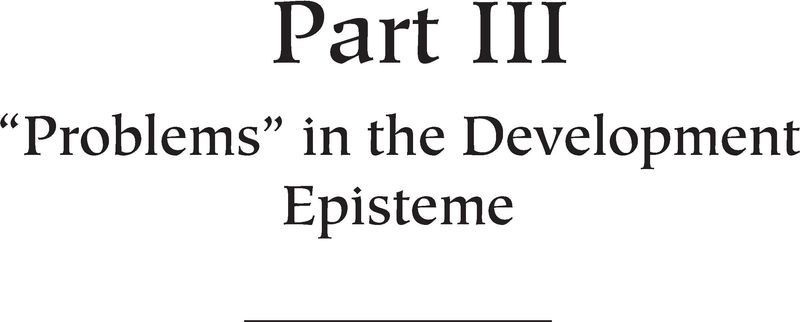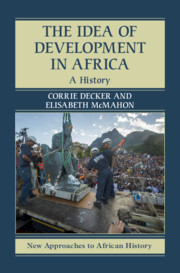Book contents
- The Idea of Development in Africa
- New Approaches to African History
- The Idea of Development in Africa
- Copyright page
- Contents
- Figures
- Tables
- Maps
- Boxes
- Acknowledgments
- Maps
- Introduction
- Part I Origins of the Development Episteme
- Part II Implementation of the Development Episteme
- Part III “Problems” in the Development Episteme
- Epilogue
- Bibliography
- Index
- References
Part III - “Problems” in the Development Episteme
Published online by Cambridge University Press: 16 October 2020
- The Idea of Development in Africa
- New Approaches to African History
- The Idea of Development in Africa
- Copyright page
- Contents
- Figures
- Tables
- Maps
- Boxes
- Acknowledgments
- Maps
- Introduction
- Part I Origins of the Development Episteme
- Part II Implementation of the Development Episteme
- Part III “Problems” in the Development Episteme
- Epilogue
- Bibliography
- Index
- References
Summary

- Type
- Chapter
- Information
- The Idea of Development in AfricaA History, pp. 185 - 274Publisher: Cambridge University PressPrint publication year: 2020
References
Further Reading
On housing practices related to the civilizing mission and early colonization see Livingstone, David, The Last Journals of David Livingstone, in Central Africa, from 1865 to His Death, 1866–1873 Continued by a Narrative of His Last Moments and Sufferings, Obtained from His Faithful Servants Chuma and Susi (Library of Alexandria, 2012); Moyd, Michelle R, Violent Intermediaries: African Soldiers, Conquest, and Everyday Colonialism in German East Africa (Ohio University Press, 2014); and White, Landeg, Magomero: Portrait of an African Village (Cambridge University Press, 1987).
On gender and domesticity see Lindsay, Lisa A., Working with Gender: Wage Labor and Social Change in Southwestern Nigeria (Heinemann, 2004); Osborn, Emily Lynn, Our New Husbands Are Here: Households, Gender, and Politics in a West African State from the Slave Trade to Colonial Rule (Ohio University Press, 2011); and White, Luise, Comforts of Home: Prostitution in Colonial Nairobi (University of Chicago Press, 1990).
On town planning and urban life see Bissell, William Cunningham, Urban Design, Chaos, and Colonial Power in Zanzibar (Indiana University Press, 2011); Jones, Hilary, The Métis of Senegal: Urban Life and Politics in French West Africa (Indiana University Press, 2013); Marris, Peter, Family and Social Change in an African City: A Study of Rehousing in Lagos (Routledge, 1962); and Njoh, Ambe J, Planning Power: Town Planning and Social Control in Colonial Africa (Routledge, 2007).
Further Reading
On the history of Islamic and Christian education in Africa see Loimeier, Roman, Between Social Skills and Marketable Skills: The Politics of Islamic Education in 20th Century Zanzibar (Koninklijke Brill NV, 2009); Saad, Elias N, Social History of Timbuktu: The Role of Muslim Scholars and Notables, 1400–1900 (Cambridge University Press, 1983). Ware III, Rudolph T, The Walking Qur’an: Islamic Education, Embodied Knowledge, and History in West Africa (University of North Carolina Press, 2014).
On colonial educational policies and practices see Bryant, Kelly M. Duke, Education As Politics: Colonial Schooling and Political Debate in Senegal, 1850s–1914 (University of Wisconsin Press, 2015); Healy-Clancy, Meghan, A World of Their Own: A History of South African Women’s Education (University of Virginia Press, 2014); Segalla, Spencer D, The Moroccan Soul: French Education, Colonial Ethnology, and Muslim Resistance, 1912–1956 (University of Nebraska Press, 2009).
On education, nationalism, and postcolonial identity see Falola, Toyin, Nationalism and African Intellectuals (University of Rochester Press, 2001); Skinner, Kate, The Fruits of Freedom in British Togoland: Literacy, Politics and Nationalism, 1914–2014 (Cambridge University Press, 2015).
On contemporary education, development, and universities in Africa see Griefenow-Mewis, Catherine, ed., On Results of the Reform in Ethiopia’s Language and Education Policies (Harrassowitz, 2009); Livsey, Tim, Nigeria’s University Age: Reframing Decolonisation and Development (Palgrave Macmillan, 2017); Shizha, Edward and Kariwo, Michael T, Education and Development in Zimbabwe: A Social, Political and Economic Analysis (Sense, 2011).
Further Reading
On health concerns linked to race, sexuality, and labor see Shane, Doyle, Before HIV: Sexuality, Fertility and Mortality in East Africa, 1900–1980 (Oxford University Press, 2013); Echenberg, Myron, Black Death, White Medicine: Bubonic Plague and the Politics of Public Health in Colonial Senegal, 1914–1945 (Heinemann, 2002); Jackson, Lynette A, Surfacing Up: Psychiatry and Social Order in Colonial Zimbabwe, 1908–1968 (Cornell University Press, 2005); Packard, Randall M, White Plague, Black Labor: Tuberculosis and the Political Economy of Health and Disease in South Africa (University of California Press, 1989); Vaughan, Megan, Curing Their Ills: Colonial Power and African Illness (Stanford University Press, 1991).
On medical knowledges and discourses see Feierman, Steven and Janzen, John M., eds., The Social Basis of Health and Healing in Africa (University of California Press, 1992); Flint, Karen E, Healing Traditions: African Medicine, Cultural Exchange, and Competition in South Africa, 1820–1948 (Ohio University Press, 2008); Graboyes, Melissa, The Experiment Must Continue: Medical Research and Ethics in East Africa, 1940–2014 (Ohio University Press, 2015); Hunt, Nancy Rose, A Colonial Lexicon of Birth Ritual, Medicalization, and Mobility in the Congo (Duke University Press, 1999); Osseo-Asare, Abena Dove, Bitter Roots: The Search for Healing Plants in Africa (University of Chicago Press, 2014); and Patterson, Donna A, Pharmacy in Senegal: Gender, Healing, and Entrepreneurship (Indiana University Press, 2015).
On colonial nutrition see Brantley, Cynthia, Feeding Families: African Realities and British Ideas of Nutrition and Development in Early Colonial Africa (Heinemann, 2002); Tappan, Jennifer, The Riddle of Malnutrition: The Long Arc of Biomedical and Public Health Interventions in Uganda (Ohio University Press, 2017); Wylie, Diana, Starving on a Full Stomach: Hunger and the Triumph of Cultural Racism in Modern South Africa (University of Virginia Press, 2001).
Further Reading
On the agricultural changes see Chima, Korieh, The Land Has Changed: History, Society and Gender in Colonial Eastern Nigeria (University of Calgary Press, 2010); Robinson, David, Paths of Accommodation: Muslim Societies and French Colonial Authorities in Senegal and Mauritania, 1880–1920 (Ohio University Press, 2000).
On the development of irrigation agriculture in Africa see van Beusekom, Monica, Negotiating Development: African Farmers and Colonial Experts at the Office du Niger, 1920–60 (Heinemann, 2001); Bernal, Victoria, “Colonial Moral Economy and the Discipline of Development: The Gezira Scheme and ‘Modern’ Sudan,” Cultural Anthropology 12:4 (1997) 447–479.
On the building of dams and their effects on African communities see Hoag, Heather, Developing the Rivers of East and West Africa: An Environmental History (Continuum, 2013); Isaacman, Allen and Isaacman, Barbara, Dams, Displacement, and the Delusion of Development: Cahora Bassa and Its Legacies in Mozambique, 1965–2007 (Ohio University Press, 2013); Leslie, Jacques, Deep Water: The Epic Struggle over Dams, Displaced People, and the Environment (Farrar, Straus and Giroux, 2005).
On the history of mining and migration in southern Africa see Cleveland, Todd, Stones of Contention: A History of Africa’s Diamonds (Ohio University Press, 2014); Moodie, T. Dunbar with Vivienne Ndatshe, Going for Gold: Men, Mines, and Migration (University of California Press, 1994).

